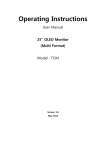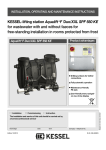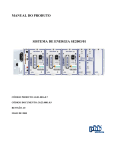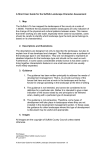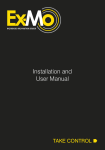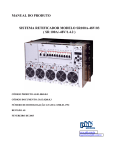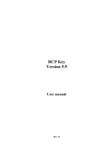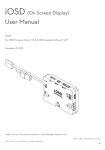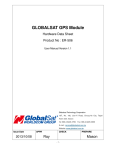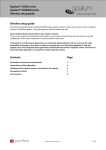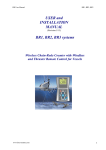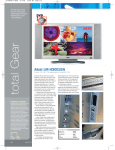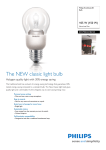Download Mains Powered Separator Alarm - User Manual ()
Transcript
MAINS SEPARATOR ALARM 20b Highbury Road Brandon Tel: 0845 8035581 Suffolk Fax: 0845 8035582 IP27 0ND Email: [email protected] Separator Alarm Installation, Operation and Maintenance Contents IMPORTANT . . ......................................................................................................................... 3 General Description . . ............................................................................................................. 4 General Operation. . ................................................................................................................ 4 Changing Factory Settings . . .................................................................................................... 4 Alarm Type. . ...................................................................................................................... 4 Check Interval . . ................................................................................................................. 5 Testing the Probe Sensors . . .................................................................................................... 5 Installation . . ........................................................................................................................... 5 Control Unit . . .................................................................................................................... 5 Probes (High Oil & High Liquid Level Probes) . ................................................................... 5 Silt Probe . . ........................................................................................................................ 6 Cable Distribution Box . . .................................................................................................... 6 Connection to Control Unit . . ............................................................................................. 6 Using a Junction Box . . ....................................................................................................... 6 Maintenance and Repair . . ...................................................................................................... 6 Technical Information . . .......................................................................................................... 7 Electrical . . ......................................................................................................................... 7 Apparatus Supply and I/O Parameters. ............................................................................. 7 Probe Cables . . ................................................................................................................... 7 Mechanical . . ..................................................................................................................... 7 Probe Enable Jumper Links. . ................................................................................................... 8 Probe Cable Terminals . . .................................................................................................... 9 Flashing Beacon Wiring . . ................................................................................................... 9 Accessories . . ......................................................................................................................... 10 20b Highbury Road Brandon Tel: 0845 8035581 Suffolk Fax: 0845 8035582 IP27 0ND Email: [email protected] Separator Alarm Installation, Operation and Maintenance Separator Alarm Installation, Operation & Maintenance European Directive Equipment Name and Type Certificate Number Specific Marking of Explosion Protection ATEX Directive Marking Notified Body CE Mark with Notified Body Number Harmonised Standards Used Serial Number and Year of Manufacture 94/9/EC Separator Monitor Type 14300 Baseefa 08ATEX0110/1 [Ex ia] IIC (-20°C ≤ Ta ≤ +50°C) Ex II (1) G Baseefa 1180 Buxton UK CE1180 EN 60079-0:2006 EN 60079-11:2007 Displayed underneath the control unit IMPORTANT Note: In all cases good, standard electrical practice should be followed, and the installation must conform to the appropriate local code of practice – e.g. BS EN 60079-25 in the UK. In essence, the installation must be such that the intrinsic safety is not compromised by: exposure to risk of mechanical damage, unauthorised modification or interference, exposure to moisture, dust and foreign bodies, excessive heat, invasion of intrinsically safe circuit by other electrical equipment or circuitry. (See Note in installation section) 20b Highbury Road Brandon Tel: 0845 8035581 Suffolk Fax: 0845 8035582 IP27 0ND Email: [email protected] General Description The standard system is supplied complete with an intrinsically safe control unit together with a high oil probe. The control unit is capable of monitoring up to 3 probe units, displaying their current status via a 2 x 16 display. The output relay enables this status to be signalled to a remote location or activate a beacon if required. General Operation The Control Unit monitors the condition of the connected probe units by checking their condition every 30 minutes1, their current status is displayed on the display located on the front of the unit. If an alarm condition is detected, a warning message is displayed followed by notification of the alarm condition detected, e.g. *HAZARD ALERT* High Oil Alarm, the output relay becomes de-energised and the internal buzzer is audible. The unit then gives the option, via the display, to accept/acknowledge the alarm. On doing so, the output relay energises, the buzzer is muted and the display instructs the user to take the appropriate action, e.g. empty the separator. After the separator has been emptied and refilled with water, the control unit re-scans the probe sensors attached and presuming no alarm condition is detected, ‘All Correct’ will be displayed. If the push button is pressed before the separator has been emptied, or it has been emptied but not refilled with water, then the control simply scans the probe sensor(s) and reverts to the alarm condition. Please note the output relay is de-energised on detection of any alarm condition or mains failure. Changing Factory Settings Alarm Type The factory setting is STD (standard), this is where the output relay de-energises upon fault detection and energises upon acceptance of the fault. Alarm Type EXT (Extended) allows the relay to remain de-energised until all alarm conditions become normal. To enter the “Set Up” mode, firstly remove power from the unit. Whilst holding down the Push Switch, power up the unit keeping the Push Switch depressed, after about 10 seconds the screen will display “Set Up”, at this point release the Push Switch. The display will now show Alarm Type: with a flashing cursor over STD, to change this function to EXT, press the Push Switch once. 1 The unit is factory set to 30 minutes, but in extreme conditions, this can be manually changed from 2 to 60 minutes at one minute intervals. (see Changing Factory Settings) 20b Highbury Road Brandon Suffolk IP27 0ND Check Interval Whilst still in the Set Up mode, power down and then power up the unit, the flashing cursor will now be next to Check Intvl: - by pressing the Push Switch, the time can be altered in increments of 1 minute between 2 and 60. To exit the Set Up mode at any time, hold the Push Switch whilst powering down and then power up again before releasing the Switch, this will return to the main screen sequence. Testing the Probe Sensors The probe interrogation function can be activated at any time by simply pressing the push switch. Installation This product has been designed and certified as being intrinsically safe. It is of paramount importance, that the unit should not be modified in any way and the installation be carried out by an approved installer, in accordance with the Environment Agency guidelines (PPG3). Any deviation from this could invalidate the certification warranty and render the unit unsafe for its intended use. Upon powering up the unit for the first time, the LCD will display the following message: HAZARDOUS AREA EQUIPMENT ACTIVATION CODE REQUIRED The unit will not be able to function without the code which can be obtained by calling. Control Unit Refer to Table 4 on page 7 for required cable specifications. The control unit must be positioned in a non-hazardous area. For all wiring details, refer to Figure 1, Table 5 and Table 6 on page 9. Probes (High Oil & High Liquid Level Probes) The high oil probe is to be installed in the separator tank such that the float housing is below the static liquid level. If a high liquid probe is required, this needs to be installed such that the float switch housing is located above the static liquid level. Both probe cables can be secured inside the neck of the separator using a probe cord guide. Please note the distance above or below the static liquid level will be determined by the type, style and/or size of separator, this information can be obtained from the separator manufacturer. However, as a general rule of thumb, the high liquid level probe should be placed 300mm above the static liquid level and the high oil probe 150mm below. 20b Highbury Road Brandon Tel: 0845 8035581 Suffolk Fax: 0845 8035582 IP27 0ND Email: [email protected] Due to the varying neck lengths (turrets) that occur within each separator, each normal probe unit is fitted with 5 metres of cable. Silt Probe The probe is suspended in the separator to a pre determined depth and the cable can be secured to the neck of the separator using a probe cord guide. Cable Distribution Box It is advisable to connect the probe cables to a cable distribution box which should be fixed near to the top of the separator neck. The probe cable can then be terminated with a waterproof plug (provided with the distribution box). The plug is then connected to the bulkhead socket (provided with the distribution box). A cable must then be laid to connect the distribution box and the control unit. The type of connection cable required will be dependent on the environment it is used in, the route taken and maximum allowable cable capacitance and inductance (see cable parameters in Table 4 on page 7). After making the connections in the distribution box, it is advisable to spray the terminals with a conformal coating lacquer to prevent moisture ingress before finally sealing them with waterproof putty. Connection to Control Unit The Probe cable should be fed through the appropriate gland in the bottom right hand side of the control unit and connected to the terminals as instructed. The mains cable, and if used, any beacon or sounder cable, must be fed through the appropriate gland on the bottom left hand side of the control unit and connected to the terminals as instructed. IMPORTANT NOTE: Under NO circumstances must the control unit casing be drilled to allow cable entry in any area(s) other than those already provided, as this would infringe the certification and therefore safety of the product. Using a Junction Box An intrinsically safe junction box should be used where incoming cable sizes have to be reduced to gain entry through the cable glands in the base of the control unit. IMPORTANT NOTE: Under NO circumstances must mains and probe cable joints be made within the same junction box other than a junction box that is approved Intrinsically safe for such purpose, as this would infringe the certification and therefore safety of the installed system. Maintenance and Repair Due to the harsh environments which the probes can be subjected to, it is advised that they are inspected and cleaned with a damp cloth at regular intervals. The control unit does not contain user serviceable parts. 20b Highbury Road Brandon Tel: 0845 8035581 Suffolk Fax: 0845 8035582 IP27 0ND Email: [email protected] Technical Information Electrical Supply Voltage Input Current Fusing Normal condition Alarm condition Primary (FS2) Secondary (FS3) Max probe cable length Relay Output 230V ±10% 50Hz 41mA 40mA T 315mA H 250V 50mA (Baseefa approved) 200m (less if values in Table 4 would be exceeded) Volt-free SPCO contact 3A Table 1 – Electrical Specifications Apparatus Supply and I/O Parameters Um 253Vrms Table 2 – Mains Supply and Relay Contact Terminals (TB2 & TB3) Uo Io Po Ci Li Table 3 – Hazardous Area Terminals (TB1) Group Capacitance (µF) IIC 1.15 IIB 7.4 IIA 27 Table 4 – TB1 Load Parameters 12.6V 87mA 273mW 0 0 Inductance (mH) 4.6 18.7 37.5 OR L/R Ratio (µH/Ω) 74 298 596 Probe Cables The total capacitance and inductance of the cable used between the control unit and the probe must not exceed that shown in Table 4. Mechanical Protection and/or screening of the cable should also be taken into account. The maximum length of cable between probe and control unit must not exceed 200 metres or less if the values in Table 4 would be exceeded. 20b Highbury Road Brandon Tel: 0845 8035581 Suffolk Fax: 0845 8035582 IP27 0ND Email: [email protected] SLT LQD OIL Probe Enable Jumper Links SLT LQD OIL JUMPER LINKS RELAY OUTPUT PROBE INPUT A B OIL C D E LIQUID F G H SILT NC COM NO MAINS INPUT L N L N OUT IN 230V AC E PCB-1006 SIGNAL CABLES RELAY OUTPUT CABLE Figure 1 - Probe enable jumper links 20b Highbury Road Brandon Tel: 0845 8035581 Suffolk Fax: 0845 8035582 IP27 0ND Email: [email protected] MAINS CABLE To operate a probe, REMOVE appropriate jumper link Probe Type High Oil High Liquid Silt Table 5 – Probe enable jumper links Remove Link OIL LQD SLT Probe Cable Terminals Probe Type A B High Oil RED BLUE High Liquid Liquid (Optical) C D E - RED BLUE BROWN GREEN/ YELLOW BLUE Silt F G H BROWN GREEN/ YELLOW BLUE Table 6 - Probes cable wiring connection details Flashing Beacon Wiring The relay output terminals, TB2, may be used to operate a 230V flashing beacon when an alarm occurs. The beacon should be wired according to Table 7 and Table 8. Any commoning of live and neutral connections must be done externally to the unit’s enclosure. TB2 Terminal Connect To NO No Connection COM TB3 Mains live NC Beacon Live Terminal Table 7 – wiring from relay output to beacon TB3 Mains Terminal Connect To L out TB2 COM Terminal N out Beacon Neutral Terminal E Mains earth Table 8 – wiring to beacon from relay output 20b Highbury Road Brandon Tel: 0845 8035581 Suffolk Fax: 0845 8035582 IP27 0ND Email: [email protected] Accessories Part No. High Oil Probe (conductivity) --------------------------------------------------- 14200 High Level Probe ------------------------------------------------------------------ 14210 Silt Probe ----------------------------------------------------------------------------- 14220 230 VAC Flashing Amber Beacon (Includes mounting bracket and glands) --------------------------------------- 14012 230 VAC Flashing Amber Beacon & Siren (Includes mounting bracket and glands) -------------------------------------- 14100 Probe Cord Guide ------------------------------------------------------------------ 14103 Signal Distribution Box ----------------------------------------------------------- 14039 Intrinsically Safe Junction Box (Power & Probe) --------------------------- 14006 20b Highbury Road Brandon Tel: 0845 8035581 Suffolk Fax: 0845 8035582 IP27 0ND Email: [email protected]











